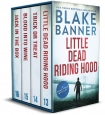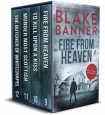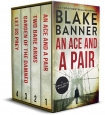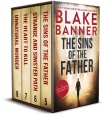Dead Cold Mysteries Box Set #4: Books 13-16 (A Dead Cold Box Set) by Blake Banner (read aloud books TXT) 📗

- Author: Blake Banner
Book online «Dead Cold Mysteries Box Set #4: Books 13-16 (A Dead Cold Box Set) by Blake Banner (read aloud books TXT) 📗». Author Blake Banner
Dehan shook her head and we stepped out of the small reception and once again into the drizzle. We squelched the forty or so paces through the mud and puddles with our collars turned up and finally came to the corner of the yard. The loose sheet of steel was now clearly visible, as were the improvised hinges in the corner, made from bent wire looped through holes punched in the edge of the sheet. I took hold of it, pulled it back and hitched it open. Dehan crouched, peered through the opening at the rich, abundant, wet grass on the other side, and stepped over the threshold. I followed.
We were on a shoulder of land that protruded into the water. The river itself was barely visible because of the thick growth of ferns, grasses, brambles, bushes and trees that swarmed along the edge. To the left, the shoulder ended abruptly beyond an elder tree and plummeted twelve or fifteen feet down to the dark water of the river. To the right, the shoulder tapered into a narrow path that skirted the fences and buildings, following the course of the river upstream toward the bridge. Ahead of us, it was just a tangle of undergrowth, obscuring the river from view.
Looking back on either side of the improvised gateway, there were old plastic chairs, a table made out of wooden boxes, and signs that, in the summer, there was probably a portable fridge hooked up to the mains there. No doubt they stored water and fruit juice in that fridge.
Dehan stood a while with her hands in her pockets, looking at the dense undergrowth. She started talking without looking at me.
“This is the answer to your question. He is not a criminal mind. He is not imaginative or very intelligent. He is a very simple man and he works at a place—there must be a dozen like this—that has access to he river, where workers come on their lunch and coffee breaks, to relax and crack a surreptitious beer.
“When it dawned on him that he had killed his sister, he must have panicked, dumped her in the truck and the first thing that came to his mind was to bring her here, weigh her down with rocks and rubble, and dump her in the river. It couldn’t have been easy. He would have had to clear a path through all that…” She jerked her head at the undergrowth. “…to make sure she didn’t get caught in the brambles and branches. But having done that, all he had to do was let her slide and sink.”
I nodded, though she couldn’t see me. After a moment, she started talking again.
“She must have lain down there, in the cold water, for almost a week. He couldn’t face coming here, so he left his job. And eventually, the combination of the current, the gases in her decomposing body and the improvised nature of the weights he must have used all eventually released her and allowed her to float down river.”
She turned to look at me at last, with the rain trickling down her face. I wiped the rain from mine with my hand. She said, “This is what you foresaw when we went to look at the place where she was found.”
I shrugged. “Part of it.”
“What do we do now?”
“We go and we tell the inspector what we’ve found. If he still insists on closing the case, we tell him we’ll go to the press and the TV networks.”
“OK. And then we bring Sam in for questioning.”
I nodded. “Let’s go talk to the inspector.”
SEVENTEEN
When we got there, he was on the phone. We could hear him through the door. I rapped with my knuckles, but didn’t wait for a reply. I opened the door and pushed in. Dehan closed it behind us. Deputy Inspector John Newman’s face was an adrenaline-fueled slideshow of emotions, from anxiety and distress at what he was hearing on the phone to outrage at our entering unbidden and concern at not wanting to upset us. His eyebrows went up and down, his mouth opened and closed, his eyes widened and narrowed. He drew breath. He held it. He sighed.
Then, he dropped into his chair, closed his eyes and said, “Yes, sir. I will be sure to do that. Yes, sir… Yes, sir… Indeed. I’ll do that.”
He hung up, raised his eyes and stared up at me. I stared down at him and said, “Sir, I don’t think I made myself clear on the phone. Lenny did not kill Celeste Reynolds.”
He took a deep breath, held it, closed his eyes and flopped back in his chair. Without opening them, he said: “Based on what, John?”
It was Dehan who answered, “Based on the fact that a smart cop with Lenny’s experience of homicides in the Bronx would not in a million years have gone to the unnecessary trouble—and risk—of dumping a body up river. Sir, there is nowhere to dump a body up river without running a huge risk of getting caught. Plus in November, up there, with the rain, the cold and the dark, access to the river is very difficult. Carrying a hundred pound dead weight, it would be virtually impossible. Lenny, just like any other homicide cop in the Bronx, would know instinctively to dispose of the body south, in one of the parks, where access is easy and the currents feed directly into the East River. Stone saw this from the start and I ignored him.”
He sighed again. “That is sound theory, but only theory, and we have the very real, practical, fact that Lenny ran and tried to kill you—and a number of other cops as well. It is as good as a confession.”
I drew





Comments (0)